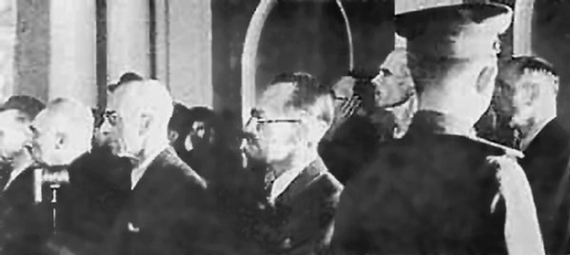As Europe commemorates the 70th anniversary of the end of World War II, a troll army secretly floods websites with pro-Putin propaganda while Russian government officials openly defend the indefensible. Moscow archivists are spreading misinformation to whitewash Soviet history.
Last month, Russian archives posted documents purportedly showing that the Polish Army was allied with Nazi Germany. The agency's head, Andrei Artizov made the absurd claim that Poland stabbed Russia "in the back." This is rehashed agitprop from a 1945 Stalinist show trial.
In the "Trial of the Sixteen," Joseph Stalin prosecuted Polish underground leaders as Adolf Hitler's allies. It's Orwellian doublespeak because it was Stalin who allied himself with Hitler in the 1939 Molotov-Ribbentrop Pact. In reality, World War II began when Germany and Soviet Russia attacked Poland from two sides, splitting the country in half.
Poland's freely elected government was exiled to London, while the Polish underground army continued fighting the Nazis for the next six years.
In the territory captured by the Soviet Army, half a million Poles were sent to Siberian gulags where they were starved, frozen and worked to death. Stalin ordered the murder of 22,000 Polish officers in the Katyn Forest. Their hands were tied behind their backs and they were each shot in the back of their heads. When Germany invaded Russia, the Nazis discovered the mass graves and reported it. Stalin lied and claimed the Germans did it.
Poles stabbed Russians in the back? No, Russians shot Poles in the back of their heads.
After six years of German occupation, the people of Warsaw rose up when the Soviet Army approached the east bank of the Wisla River. The Russians urged Poles to "rise up," but it was a cynical ploy. If Poles liberated their own capital, the Russians knew they'd never take over. So this time, Stalin ordered his troops to watch for 63 days as the Germans killed 200,000 Poles, mostly civilians, during the Warsaw Uprising.
Afterward, Russian troops marched through the rest of Poland. Stalin was not about to relinquish this territory. So when the remaining Polish underground army and political leaders gathered in 1945, Stalin invited them to a villa outside Warsaw to organize a new government.
It was a trap.
The Poles were kidnapped by the NKVD, Stalin's secret police, and flown to Moscow and jailed in the infamous Lubyanka Prison where they were interrogated, tortured and prepared for their trial. There were 16 Polish officials in all.
They fought Nazi Germany longer than anyone, yet Stalin charged them as collaborators. Unbeknownst to the Poles, a month before their arrest, Franklin Roosevelt and Winston Churchill made a backdoor deal at the Yalta Conference ceding half of Poland's territory to the Soviet Union in exchange for Stalin's promise to allow "free and unfettered elections" in an "independent Poland."
Stalin had no intention of keeping this promise.
The Soviets declared that they had "liberated" Poland and then propped up a puppet regime, the Polish Committee of National Liberation. The Polish Home Army and government in exile in London objected, but to no avail.
At first, the Russians claimed they did not have the 16 in custody. But when it became obvious that they did, the Kremlin had to stage a trial as propaganda production. The 16 were marched into the courtroom at gunpoint and forced to confess to bogus crimes. Most of the prisoners broke down, and were eventually allowed to live in Soviet-occupied Poland. But three of the 16 mysteriously disappeared from prison and were never heard from again.
George Orwell wrote a scathing letter to the British democratic socialist magazine Tribune, saying the 16 Poles "were accused of trying to preserve the independence of their country against an unelected puppet government."
So last month when the Russian Federal Archival Agency once again attacked the 16 Poles, the Polish Institute for National Memory took out a full page ad in the Russian newspaper Komsomolska Pravda asking for anyone with information on those disappeared prisoners to speak up.
Russians are known for airbrushing photos and erasing blots from their history. Hopefully, someday soon, Russians will get the democratic government that everyone deserves. Democracies make good neighbors, while autocracies are dangerous.
Rough justice is nothing new for the Kremlin. It has historically used show trials to terrorize domestic critics and its neighbors. Even now, the suspect in the Boris Nemstov assassination says he was beaten and forced to confess. The truth is unlikely to emerge, even with a show trial.
That's because in Russia, justice is not blind. It's a theater production.

